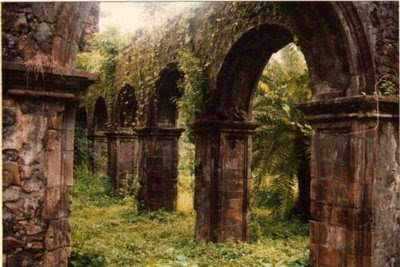Bassein Fort (Basin) also recognized, as Vasai Fort is an important sea fort located in Bassein, present day Vasai. Built by Bahadur Shah, sultan of Gujarat, it was originally one of a chain of forts intended to guard the coast against the Portuguese and the pirates. Bassein, however, fell into many hands such as- the Portuguese, the Marathas and lastly the British. In the course of time Bassein became a prosperous shipbuilding centre and the famous Bassein stone was very much in demand. This fort is about 55 Kms from Mumbai. By road, it is a 77 km long journey along the Mumbai-Ahmedabad highway. Bassein can also be reached by train from Churchgate to Vasai Road and thereafter 11 kms by rickshaw from the railway station.
The fort is very big, with the main gate leading to a small courtyard, from where one can climb the ramparts to take a look around, which reveals the numerous old structures of the fort now in ruins. The Portuguese buildings in the interior of the fort are in ruins, although there are enough standing walls to give a good idea of the floor plans of these structures. They are usually adorned with carved stones, some weathered beyond recognition, others still displaying sharp chisel marks. Three chapels inside the fort are still identifiable, which have facades typical of 17th century Portuguese churches. The southernmost of these has a well-protected barrel vaulted ceiling. Several watchtowers still stand, with staircases leading up.

Image courtesy : http://bp1.blogger.com
Bassein was well-known as a place for ship building in the 15th Century. The Portuguese settled here because they were sharp enough to recognise the importance of Bassein as a strategic place on western coast. They conquered the fort from the Sultan of Gujarat and remodeled it by building a citadel inside. The Bassein fort was made the northern capital of the Portuguese, later then over a span of 200 years they built for its aristocracy, a walled city overlooking the sea. This city contained a cathedral, 13 churches and 5 convents. Many of the buildings still stand erect, albeit without roofs. In the 18th century the fort was attacked by the Maratha army under Baji Rao Peshwa, and fell in 1739 after a three year long fight. However, it was the British who had the final ownership of the fort.
The ruins of the Portuguese fort still stand almost concealed by brushwood and palm groves. Some of the walls and churches can still be witnessed. Almost on every wall of the fort, there are trees whose roots affect the structures. The Bassein fort needs immediate attention of the authorities, to retain the last relics of this historic place.
About 10 kms to the northwest from the fort is the Nalasopara village, the capital of the Konkan region. Many Buddhist relics were found here. This place is believed to have been the birthplace of Buddha. An hour by bus travel from Bassein station are the Vajreshwari temple and the Akoli hot springs. Ganeshpuri with the Sadguru Nityanand Maharaj Samadhi Mandir, the Bhimeshwar temple and other ashrams are also easily reachable.

No comments:
Post a Comment